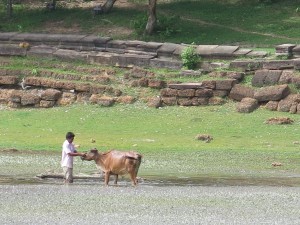The following funding opportunities have been announced. Please follow the links for more information:
The Academy of Medical Sciences is inviting applications to the Starter Grants for Clinical Lecturers scheme. They are offering funding of up to £30,000 to cover the cost of research consumables. The grants allow research-active Clinical Lecturers to gather data to strengthen their bids for longer-term fellowships and funding. An application form can be downloaded. The deadline for applications is 5pm, 01/09/2014.
The BBSRC in collaboration with the Department for Environment, Food & Rural Affairs (Defra), announce a call to support fundamental bioscience that will address key gaps in the knowledge of bovine tuberculosis (bTB) biology. The total amount of funding available for the call is £6 million (BBSRC are contributing £5M, and Defra, £1 million). A letter of intent must be submitted before 4pm, 04/11/2014, and it is expected that the full application deadline will be at the end of February 2015.
The British Academy will soon be inviting applications to the BA Skills Acquisition Awards. Quantitative Skills Acquisition Awards are available to support career development of early career scholars (within 10 years of the award of the doctorate) who are in established academic posts. These awards aim to develop and enhance their quantitative skills by providing an award to enable early career researchers to spend some time with a mentor at a specialist centre in the field.
The British Academy is inviting applications to the Elisabeth Barker Fund. The Fund was established in memory of Elisabeth Barker (1910-1986), diplomatic correspondent and historian of modern Europe. It is intended to support studies in recent European history, particularly the history of Central and Eastern Europe. Grants may be made for individual, or collaborative projects and may support British scholars, or scholars from other European countries. The maximum award amount is £1,000 and the closing date for applications if 15/10/2014.
The British Academy is also inviting applications to their Elie Kedourie Memorial Fund. The fund, established by the family of Elie Kedourie, FBA, is to promote the study of Middle Eastern and Modern European History, and the History of Political Thought by recent postdoctoral scholars of any nationality. Awards are offered to support any aspect of research, including travel and publication. The maximum award amount is £1,000 and the closing date for applications is 15/10/2014.
The British Academy has announced that they will soon be accepting applications to the Stein-Arnold Exploration Fund. The Fund was established according to the terms of the Will of Sir Aurel Stein, FBA, to commemorate his friendship with Sir Thomas Arnold, FBA, for ‘the encouragement of research on the antiquities or historical geography or early history or arts of those parts of Asia which come within the sphere of the ancient civilisations of India, China, and Iran, including Central Asia. Research should be ‘so far as possible by means of exploratory work’, and applicants must be British or Hungarian subjects. Awards do not exceed £ 2,500. Application forms are being made available from 22/10/2014 and the deadline for applications is 03/12/2014.
2,500. Application forms are being made available from 22/10/2014 and the deadline for applications is 03/12/2014.
The British Academy has also announced that they will soon be accepting applications to the Neil Ker Memorial Fund. The object of this fund is to promote the study of Western medieval manuscripts, in particular those of British interest. Applications are invited from scholars of any nationality, engaged on original research intended for publication. Applicants should be of postdoctoral status, or have comparable experience. Awards do not normally exceed £2,000. Application forms will be made available from 22/10/2014 and the deadline for applications is 03/12/2014.
The British Academy will soon make applications for the BA/Leverhulme Small Research Grants scheme available. Grants are available to support primary research in the humanities and social sciences. The first recourse for funding should be to your own institution (where applicable). Applications will not be considered for less than £500. The maximum grant is £10,000 over two years. Applications for collaborative or individual projects are equally welcome under this scheme. Applications forms will be made available from 03/09/2014 and the closing date for applications is 15/10/2014.
Dstl and BAE Systems are seeking proposals for the Autonomous Systems Underpinning Research – ASUR 2014 programme. This competition is seeking research proposals in a set of specific areas relating to technologies that are potentially applicable to enhancing the development and operation of future autonomous systems that will enable the UK Armed Forces to successfully meet the operational challenges that they will encounter over the next decade and beyond. Up to £2.4 million of funding is available for this competition. The deadline for applications is 13/10/2014.
The ELRHA (enhancing learning & research for humanitarian assistance) have now launched their Ebola Health Research call. The aim of the call is both to produce robust research findings that could contribute to the effectiveness of the response to the current outbreak, and help to draw lessons for future outbreaks of Ebola and other communicable diseases. Funding is being made available through the existing £6.5 million R2HC programme. Given the urgency of this situation, qualified researchers are invited to submit a preliminary Expression of Interest application to ELRHA by 11am, 08/09/2014.
The ESRC have made a pre-call announcement for the Transformative Research call. The aim of this call is to provide a stimulus for genuinely transformative research ideas at the frontiers of the social sciences, enabling research which challenges current thinking to be supported and developed. Successful applicants will receive a grant of up to £250,000 (at 100 per cent full economic cost (fEC)). ESRC will meet 80 per cent of the full economic costs on proposals submitted. Only two applications can be accepted from each eligible Research Organisation. Proposals should be pre-selected by the Research Organisation and will need to be submitted to the ESRC at the beginning of January 2015. The full call specification will be released in September 2014.
The Medical Research Council has mentioned on their website that they will soon be taking applications for the Biomedical Informatics Fellowship. The fellowship supports outstanding post-doctoral researchers who are seeking to move into the application of mathematical, statistical and computational methods to biomedical and health research problems. Applications are being made available from 05/05/2015 and the deadline for applications will be 16/06/2015.
The Medical Research Council has announced that they will soon be inviting applications to the Career Development Award (CDA) in Biostatistics. This CDA in Biostatistics encourages broad training programmes in biostatistics to support talented early-career researchers who have recently completed their PhDs and who are working in – or seeking to move into – statistically based, health-related research. The CDA provides full personal salary costs together with support for consumables expenses, travel costs and capital equipment appropriate for the research project. The opening date for applications is 17/03/2015 and the closing date is 28/04/2015.
The Medical Research Council has also announced that they will soon be inviting applications to their Early Career Fellowship in Economics of Health. The fellowship provides early-career support to help individuals begin to establish a research track record in the field and to undertake further training. The EoH provides full personal salary costs, together with support for consumables expenses, travel costs and capital equipment appropriate for the research project. The opening date for applications is 05/05/2015 and the deadline for applications is 16/06/2015.
The Medical Research Council has also announced details of the Methodology Research Fellowship. The fellowship supports post-doctoral researchers with a grounding in health research, not necessarily in a methodological discipline, who will advance the development and application of innovative methodologies in the context of challenging biomedical and health research problems. It will provide a significant career development opportunity for these researchers to become independent researchers in their chosen fields. Full personal salary costs will be provided, with support for research staff, consumables expenses, travel costs and capital equipment appropriate for the research project. The opening date for applications is 05/05/2015 and the deadline is 16/06/2015.
The Medical Research Council has announced details of the Molecular Pathology Nodes scheme. MRC and EPSRC invite proposals to establish high-quality molecular pathology nodes. Each node will be a multidisciplinary centre of innovative molecular diagnostic test discovery and development bringing together the research base, pathology/genetic services and industry. The call will have four phases, 1) Call workshop, 2) Expression of interest, 3) Proposal, 4) Monitoring. A workshop will be hosted on 01/10/2014 in London – the workshop registration form needs to be completed by 15/09/2014. The deadline for expression of interest is 10/11/2014 and for the proposal is 10/02/2015.
The Medical Research Council will soon be inviting applications to their Population Health Scientist Fellowship. The fellowship supports outstanding early-career researchers to conduct research and develop the skills required to underpin a career in the population health sciences. The award provides a competitive personal salary and a research training support grant of up to £20,000 per year. The opening date for applications is 05/05/2015 and the closing date for applications is 16/06/2015.
The Medical Research Council is now inviting applications to their Senior Clinical Fellowship. The purpose of the scheme is to support outstanding medically and other clinically qualified professionals in their development to become research leaders. The fellowship will provide full personal salary costs, together with support for research staff, consumables expenses, travel costs and capital equipment appropriate for the research project. The opening date for applications will be the 25/02/2015 and the closing date for applications is the 08/04/2015.
NERC, in collaboration with Communicate 2014 (British Natural History Consortium) are inviting applications to the NERC bursary scheme. The scheme is open to NERC funded postgraduate students, postdoctoral researchers and NERC fellows only. Applications from students and researchers who have not previously attended Communicate will be prioritised. The deadline for applications is 9am, 06/10/2014.
The Agri-Tech Catalyst, run by the Technology Strategy Board and the Biotechnology and Biological Sciences Research Council, offers funding to innovative businesses and researchers to develop solutions to global agricultural challenges – this is the late-stage awards. There are two types of late-stage awards that projects may be eligible for: pre-experimental feasibility study awards and experimental development awards. Funding through the Agri-Tech Catalyst is available to UK businesses of any size, as well as researchers. The deadline for applications is 07/01/2015.
The Technology Strategy Board and the Biotechnology and Biological Sciences Research Council are also inviting applications to the Industrial research awards. Industrial research awards enable applicants to evaluate the technical feasibility of an idea and establish proof-of-concept and potential routes to exploitation. Such proposals will embrace longer-term studies in all relevant disciplines that demonstrate the potential to advance the sustainable intensification of agriculture and have an economic impact. Registration for expressions of interest closes on 01/10/2014 with a submission deadline of 08/10/2014.
The Technology Strategy Board is inviting applications to their Adapting cutting-edge technologies project. They will be investing up to £7m in collaborative R&D projects to encourage technologies for road-vehicles that will deliver significant reductions in CO2 emissions and they expect projects to range in size from total costs of £500k to £2m, although they may consider projects outside this range. The competition opens for applications on 08/09/2014. The deadline for registration is noon, 22/10/2014 and the deadline for applications is noon, 29/10/2014.
The Technology Strategy Board and the Environment Agency are now inviting applications to the Non-intrusive river flow measurement competition. This competition is focused on the Environment Agency’s need to measure river flows in challenging locations where existing standard instrumentation cannot be used. However, a solution that could also be deployed in less demanding/normal river conditions would be ideal. In order to enter this competition, registration is required. Registration closes on 15/10/2014 and applications are due in by 22/10/2014. The award is still to be confirmed.
The Welcome Trust is inviting applications to the Developing Excellence in Leadership, Training and Science Initiative. The vision of DELTAS Africa is to support the African-led development of world-class researchers and research leaders in Africa. This new generation of scientists will play a major part in shaping and driving a locally relevant health research agenda in Africa, contributing to improved health and development in the continent. Some funding is available. A preliminary application should be completed by 5pm, 02/10/2014.
The Welcome Trust is now inviting applications to their Engagement Fellowships scheme. Engagement Fellowships champion the leaders of tomorrow by fostering the most promising developing talent. They are looking for individuals with a strong track record of engaging the public with ideas around biomedical science and/or medical humanities, who want to make a step-change in their careers. The deadline for applications is 13/02/2015.
Please note that some funders specify a time for submission as well as a date. Please confirm this with your RKE Support Officer.
You can set up your own personalised alerts on ResearchProfessional. If you need help setting these up, just ask your School’s RKE Officer in RKE Operations or see the recent post on this topic, which includes forthcoming training dates up to November 2014.
If thinking of applying, why not add notification of your interest on ResearchProfessional’s record of the bid so that BU colleagues can see your intention to bid and contact you to collaborate.












 The Engineering and Physical Sciences Research Council (EPSRC) invites applications for its
The Engineering and Physical Sciences Research Council (EPSRC) invites applications for its 













 FHSS academics teaching in Nepal
FHSS academics teaching in Nepal New weight change BU paper
New weight change BU paper One week to go! | The 16th Annual Postgraduate Research Conference
One week to go! | The 16th Annual Postgraduate Research Conference Geography and Environmental Studies academics – would you like to get more involved in preparing our next REF submission?
Geography and Environmental Studies academics – would you like to get more involved in preparing our next REF submission? Congratulations to three former BU staff
Congratulations to three former BU staff MSCA Staff Exchanges 2024 Call – internal deadline
MSCA Staff Exchanges 2024 Call – internal deadline Applications are now open for 2025 ESRC Postdoctoral Fellowships!
Applications are now open for 2025 ESRC Postdoctoral Fellowships! Horizon Europe – ERC CoG and MSCA SE webinars
Horizon Europe – ERC CoG and MSCA SE webinars MaGMap: Mass Grave Mapping
MaGMap: Mass Grave Mapping ERC grants – series of webinars
ERC grants – series of webinars